In the School of Culture & Society, our Department of Law works closely with the Departments of Politics and International Relations, Sociology, Anthropology, Media, Communication & Cultural Studies, and History. An exciting new cross-School initiative, ‘Beyond the Classroom’, brings together students and academic staff from across these departments, and other parts of Goldsmiths, to immerse them in a range of opportunities, beyond the classroom, beyond the University itself, making the most of what London has to offer, professionally, culturally, institutionally, socially.
“The experience at University should be greater than the sum of its – traditionally conceived, academic – parts, the knowledge communicated through lectures or seminars, and the coursework or examinations that support its delivery. Experiencing the world, connecting with others, developing critical thinking skills, understanding how theory is applied in practice (who facilitates its application, and who is a stumbling block, and how to overcome them), exploring the plethora of interests that will make you a well-rounded individual, and enjoying yourself in the process of doing all that, should matter as much as the more formal aspects of the curriculum. University should be a world where you are continuously meeting inspirational people and going on life-shaping trips, where you are empowered to reflect on the past, engage with the present and be part of the debates that have the capacity to forge the solutions that we need for the future. You should be feeling fulfilled, intellectually and emotionally, by the sheer richness of the opportunity you are exposed to. That’s what ‘Beyond the Classroom’ aims to achieve. We’re setting the bar high, no doubt, but we’re thrilled with the response we’ve had so far” – this is how Professor Dimitrios Giannoulopoulos described the programme. Prof Giannoulopoulos is the Head of the Law Department, who has designed and is leading on Beyond the Classroom (BtC), in his role as Associate Head (Student Experience) in the School of Culture & Society.
So how does BtC work exactly? It is a programme that exposes our students to an array of experiential learning, immersive, student-community-building activities, from visits to legal, political and cultural institutions, to engaging with theatre, cinema, art, architecture, and contributing to Clinic projects or going on study abroad visits, and whose elasticity enables students to switch from attending a formal seminar (at the University of London, with the first female president of the Supreme Court, Lady Hale, for instance) to going to a futuristic, dystopian exhibition at 180 Studios or watching the Palme d’Or winner at the Ciné Lumière at the French Institute or Oppenheimer at the BFI IMAX or taking part in debating exercises or exploring Law and social sciences through imagining and performing theatre scenes (things you would not expect to do as a Law student or a student in Sociology or Politics or History or Anthropology for that matter). And to be doing all this alongside a community of students who come from this variety of disciplines, with different backgrounds, often different future career destinations, but who easily merge into one, when we’re out and about in London, opening up and sharing their experiences with each other; studying at University is absolutely the greater than the sum of its parts, when delivered this way.
“One of the things that really drew me to Goldsmiths was its hands-on, immersive learning experiences, both inside and outside of the classroom”, said Sophia, a Year 1 student in Law. “The Beyond the Classroom initiative has far exceeded my expectations and has enabled me to meet people throughout the various year groups of my course, and the university”, she added. “It has already shaped me to become both a stronger academic and a better, more informed, member of society. This ground-breaking initiative is leaving an impact that will remain with me long after the completion of my degree”, she concluded.
Here are some of the Beyond the Classroom highlights since the launch of the programme in April 2023.
April 2023
A visit to the world renowned Cambridge Union, to attend the Cambridge Literary Festival, for Gary Younge’s thought-provoking book talk From Nelson Mandela to Black Lives Matter. We attended with 9 students from Anthropology and Law. Meeting with Gary Younge after his talk, having copies of his book signed by him, then going off to explore picturesque Cambridge, before getting on our train back to London, were some of the highlights. Listening to Law and Anthropology students interrogate each other about their subjects was undoubtedly another.
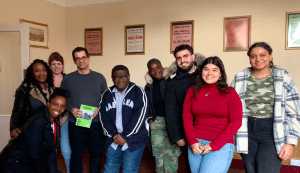
June 2023
5 students from our Journalism, Media, Politics, Sociology and Anthropology departments joined the Law department’s annual Summer School in Athens in June, on Human Rights, Law, and Policy: Britain, Greece and the EU. All 19 Goldsmiths students were supported by generous student scholarships; widening access and participation for all is a key priority for Beyond the Classroom. Read about the summer school here.
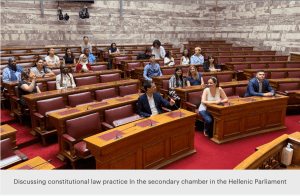
September 2023
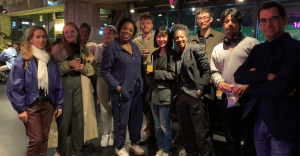
We were thrilled to go to the National Theatre, one of the pinnacles of cultural life in the capital and the UK more generally, to attend the explosive play The Effect, with 20 students from our Anthropology, Law, Media, Journalism, and Politics departments. To meet and chat with the lead female actress, Michele Austin, after the play was nothing short of breathtaking. Her understudy, Shereener Browne, a former barrister who has switched to theatre after a successful career at Garden Court Chambers, and who is a very good friend of Goldsmiths, has made the introductions.
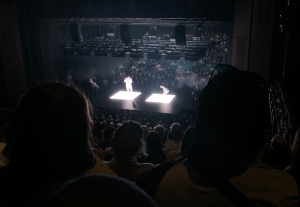
November 2023
Another pinnacle, of the world of art this time, the world-renowned Royal Academy of Arts, was our next destination. With 10 students, from PPE, Law, Anthropology and other departments in our School of Culture & Society, we attended the Architecture Dorfman Awards Prize ceremony, and were fascinated by the breadth of ideas, methodologies and practice, and their pertinence to our study of social sciences.
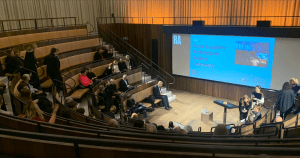
Ideas discussed included participatory designs (as opposed to the imposition of top down, corporate ideas); exposing patriarchal, colonialist and capitalist ideas; pursuing socio-ecological relationships and emancipatory practice; the democratisation of technical knowledge; searching for equitable ways; synchronising with what surrounds us; adopting Transhistorical approaches where different historical spaces are mixing in the same space and time; utilising the power of communication; understanding the importance of interdisciplinary practice, and doing the less. All ideas and concepts our students in Law, Media and Social Sciences can take inspiration from and draw upon in their research and work.
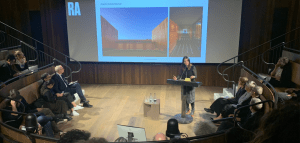
Taller Gabriela Carrillo presenting on innovative designs for Courts of justice in Mexico.
We were invited to attend the drinks reception after the awards ceremony, and were enthused to speak to some of the nominees and the award winner, Taller Gabriela Carrillo. They were impressed that we were attending with non-architecture students.
Next stop, the Royal Society of Arts, where we were privileged to welcome to BtC Dr Susie Alegre, international human rights lawyer and author of the influential Freedom to think book, which identifies huge concerns about the impact of technology on our freedom to think, and advances the latter as the modern extension of the right to privacy, freedom of expression and freedom of belief.
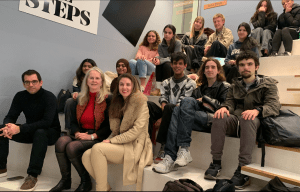
Susie was in conversation with Prof Giannoulopoulos, exploring challenging debates in the area, ranging from behavioural micro targeting and drawing inferences from your thoughts in criminal justice to Cambridge Analytica and Brexit, social media and the future of parliamentary democracy in a technology-dominated world.
From discussing parliamentary democracy to visiting Parliament itself: BtC joined forces with the wonderful History student society in the synonymous department, in co-organising the visit to the House of Commons. Students learnt about the history of Westminster palace, and of the institutions it hosts, and have moved like MPs from the main hall in the House of Commons to the ‘Aye and no’ lobbies (where MPs vote); what can be more invigorating and thought-provoking than observing from so close, for students of Politics, International Relations and Law, or the sociologists and media students who study the political phenomena and processes from their distinctive perspectives.
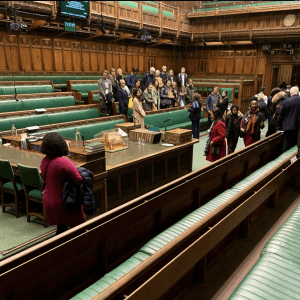
Our attention switched next to war and international law, with our first ‘lunchtime get together’ session in the programme, led by Media colleague and Airwars director, Emily Tripp, who spoke to us about the NGO’s work on forensically investigating, digitally, Iranian suicide drones in Ukraine and Israeli bombing in Gaza.
These BtC lunchtime sessions allow students and staff to get together – over coffee and a sandwich or cake – and learn about the work, career pathway and destination of leading faculty and our external partners at Goldsmiths as well as share their thoughts and aspirations for the topics in question or the paths they are wishing to follow beyond University.
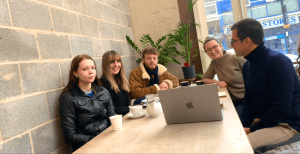
December 2023
We continued through to December with our digital world theme, thinking about the sea of data surrounding us, how they are captured, processed and analysed. Algorithms. Synchronous movement. Order, disorder, the rise of AI, the fear of a dystopian and futuristic world that is beginning to emerge, now. We became alert to these mind-boggling issues by attending Synchronicity, at 180 Studios.
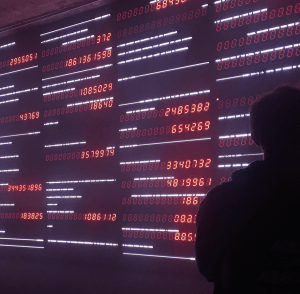 We then took another 180 degree turn, going from future debates to looking back, through a historic lens. Watching Ridley Scott’s Napoleon, with 20 students from across our different departments, at the stupefying BFI IMAX screen, one of the largest in Europe, then taking 60 students to the astounding Hamilton musical at the West End (a History society activity that BtC was delighted to sponsor and support), offered food for thought, much food for thought; views may have diverged quite considerably, especially about the reliability of the account offered by the former, but both events were hugely entertaining and educational experiences for all our students and staff who attended.
We then took another 180 degree turn, going from future debates to looking back, through a historic lens. Watching Ridley Scott’s Napoleon, with 20 students from across our different departments, at the stupefying BFI IMAX screen, one of the largest in Europe, then taking 60 students to the astounding Hamilton musical at the West End (a History society activity that BtC was delighted to sponsor and support), offered food for thought, much food for thought; views may have diverged quite considerably, especially about the reliability of the account offered by the former, but both events were hugely entertaining and educational experiences for all our students and staff who attended.
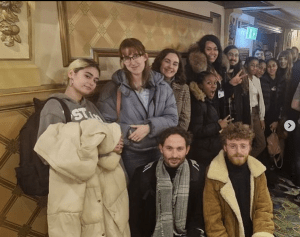
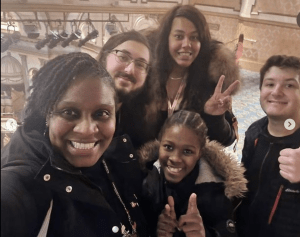
January 2024
Law and film and society, and immersing in a foreign culture (the French one, on this occasion) was a powerful combination! For our first 2024 event, we went to the Ciné Lumière at the iconic Institut Français, with 15 students and colleagues from across Media Studies, Art, Law and other departments, for a screening of the sublime Anatomy of a Fall socio-legal drama which won the Palme d’Or in Cannes this year.
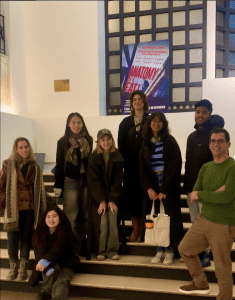
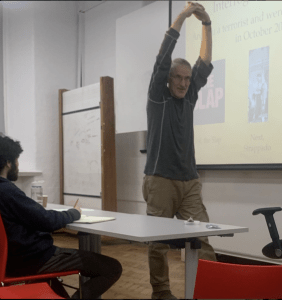
Clive Stafford-Smith demonstrating to students stress positions (the “strappado”) used frequently in counter-terrorist contexts post 9-11.
January also saw the start of our Law & Policy Clinics, on Immigration Law, with Marta Minetti, and Counter-Terrorism and Human Rights, with world-renowned lawyer, an anti-death penalty hero at the US, who has also done pioneering work to unearth the brutality of the Guantanamo Bay regime, Clive Stafford-Smith. These Clinics were previously accessible for Law students only, and through BtC students in other parts of the School of Culture & Society and College can now take part in them. More than 60 students, from a range of departments, have signed up with these Clinics.
January ended with an unforgettable encounter with the legendary Lady Hale, the first female President of the UK Supreme Court, aka “Spider Woman“. In conversation with Prof Carl Stychin, Lady Hale reflected on life episodes that made her who she became and offered insights on historic Supreme Court judgments. Zac, a Year 2 Law student at Goldsmiths, asked her to critique the continued pertinence of parliamentary sovereignty in the context of populist attacks upon human rights, such as in the context of the Rwanda policy, and she happily did so, expressing her faith in that bedrock principle of our constitutional system (“when it works, it works well”, and “Parliament, most of the time does not do things that are deeply irresponsible at all”, she exclaimed) while also showing some concern, from a human rights perspective, about some legislation that was recently introduced or legislation that is currently debated in Parliament).
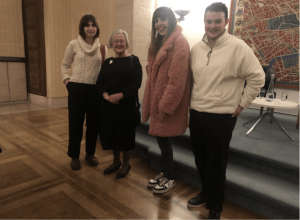
Goldsmiths Law students Josh and Sophia with Lady Hale (from right to left)
February 2024
One of the key ambitions of BtC is to energise students from across different disciplinary areas to work together, to open up new opportunities for them, outside disciplinary boundaries, allowing for the activation of new skills and aptitudes, and building a professional ethos that will be transferable to their future careers.
The Knowing Our Rights “Storytellers” initiative that the Law department developed with EachOther, and that BtC supports, in extending its reach to students across the School of Culture & Society, makes it possible to pursue this objective. This new initiative is a ground-breaking and unique opportunity for students and staff, to produce multi-media work that addresses human rights issues in the UK. Under the Knowing Our Rights: Storytellers programme, students can pitch an idea and are given editorial support in order to see their work be published by an award winning human rights charity. This innovative programme supports individuals and groups to produce thoughtful and dynamic work that addresses and raises awareness for human rights issues in the UK, and that is published in a platform with wide reach across the UK public.
In February, we were thrilled to see the publication of several student-authored news stories under this initiative, on why the UK is facing an increase in prosecutions surrounding abortion, on the importance of public engagement in shaping sentencing policy, on whether the government can really stop homelessness by 2025, and on the financial cost of convicting people by association, including ‘innocent bystanders’.
Returning to BFI IMAX, for a glorious IMAX 70 mm screening of Oppenheimer, was another highlight in February. 13 students from Media and Law watched the Oscar nomination-studded masterpiece by Christopher Nolan. The film was as much about politics and law as it was about the science behind the creation of the nuclear bomb, and it was artistically outstanding, so it could not have been more pertinent to watch it from a social sciences and media perspective.
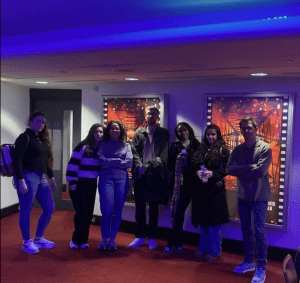
March 2024 and beyond
There are exciting events, trips and activities ahead of us this month and beyond. From attending a seminar on Hannah Arendt’s work, returning to the Institut Français for another screening of ‘Anatomy of a Fall’ (which is back by popular demand, as we had more than 80 students signing up to come along the first time we went) and a visit to Magic Circle law firm, Linklaters, to a cross-departmental Debating evening (supported by the Politics student society) and engagement in theatre and performance activities in order to interpret everyday events, pieces of news and legal facts, as well as identify forms of oppression and suggest modes of resistance, BtC intends to continue to open new horizons for our students and bring them together, in these unique ways.
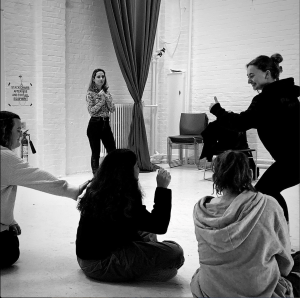
Using the power of theatre to interpret phenomena and devise creative solutions as part of Beyond the Classroom.
Events tickets, travel expenses (where possible) and all other expenses related to Beyond the Classroom activity are paid for by the University. We want to ensure that students can join without worrying about bearing the cost, in these challenging times, and that no one is left out.
Nearly 300 students from across our various departments have attended BtC events since the launch of the programme, and we look forward to engaging many more in the months ahead, hoping that every single opportunity to join is an invaluable experience for our students.
For information on BtC and to sign up to relevant activities, email Law@gold.ac.uk